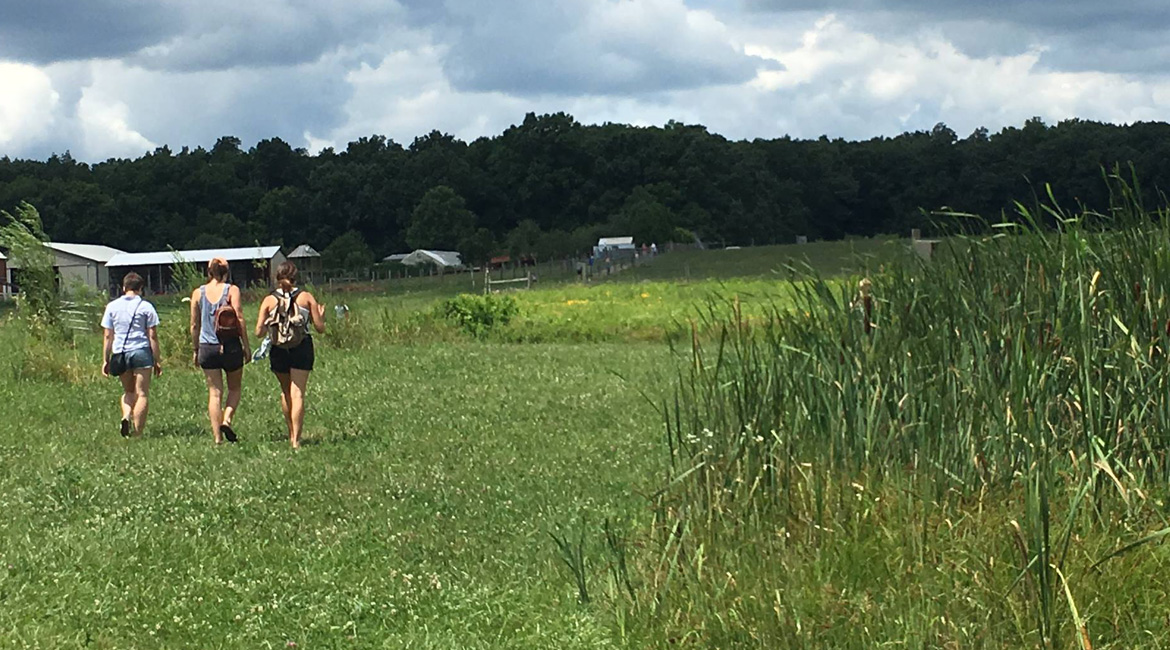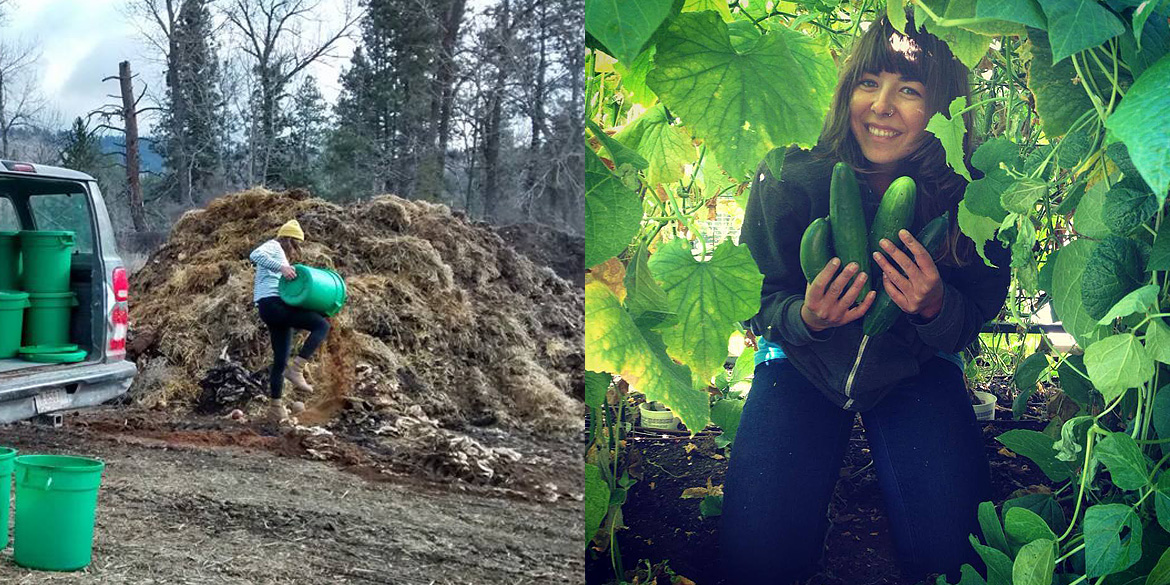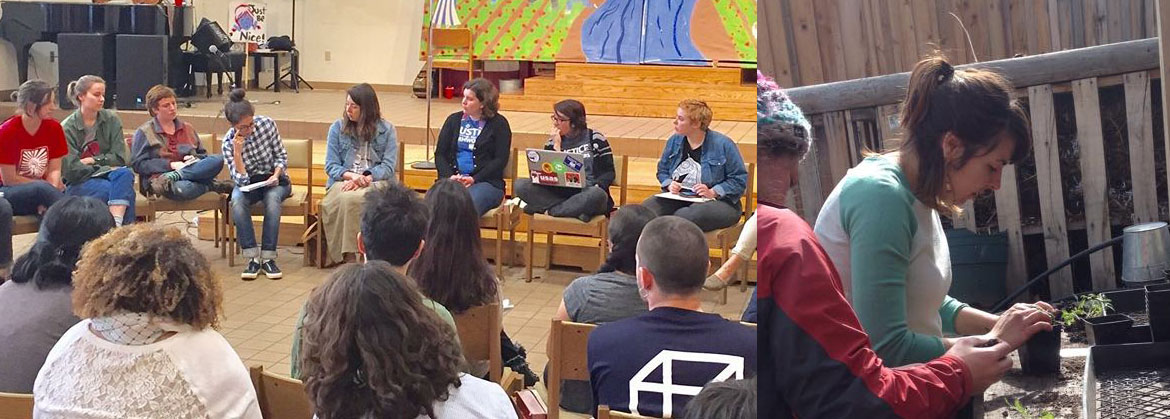Q&A: Real Talk about “Real Food” with Katie LeBlanc


Katie LeBlanc is regional coordinator for Real Food Challenge, an advocacy organization that works with colleges and universities to shift their food budgets away from industrialized agriculture to purchase more food from local farms with ethical environmental and and labor practices. A descendent of the Potawatomi nation, Katie grew up on her family’s farm in rural Kentucky, where seeing the Ohio River polluted by agricultural runoff sparked an interest in soil conservation. She holds a degree in Agronomy and Soil Science from Murray State University, and a master’s in Environmental Studies from the University of Montana.
What was your relationship to food as a young person?
Knowing how to can and preserve, cure ham, grow food, hunt, fish, it was always a part of our life, because we were just poor, but it was practices to pass on family stories and traditions as well. We planted fruit trees, we had a cow-calf operation and would sell the cattle for supplementary income. We would go mushroom hunting — it was just a way of life.
I studied agriculture and agriculture policy in college, and really started to examine policies that support and perpetuate concentration and consolidation as an economic end in our agricultural system. I wondered, why are we not being allowed to grow food in the way that we know, as farmers, as people of color, we have done for years, globally?
What do you mean by “concentration and consolidation”?
In our beef packing industry now, four companies operate around 82% of the entire market. They are so powerful that they are able to basically eliminate any competition that they have, and this loss of competition is what we call market concentration. It inherently pushes the biggest food and agriculture firms to get bigger, and to just dominate the food system with what is cheapest to produce, cheapest to process.
"What I’m fighting for is ending food apartheid, and, in indigenous communities, demanding and reclaiming food sovereignty..."
What does food justice mean to you? How is it different from food sovereignty?
Food sovereignty, as I’ve experienced and fought for, demands indigenous sovereignty and respect. Food justice, however, is a term that demands a closer examination of our entire food system and how it is perpetuating injustice within our interconnected communities, locations, demographics and beyond.
There was a great article just published by the Guardian, and it talks about no longer using the term “food desert,” but instead using “food apartheid.” The term draws in the social injustices, systemic racism, and structures of settler colonialism that play a huge factor in how our food is produced and consumed in this country at every stage. What I’m fighting for is ending food apartheid, and, in indigenous communities, demanding and reclaiming food sovereignty as a sovereign nation.

How does reducing consumption of animal products fit into this issue?
I think science has spoken — that reducing our meat consumption and increasing our vegetable and fruit intake does lend itself to healthier communities and healthier individuals. But is that something that is available to everyone? Since we know it is not, how do we restructure ourselves and demand food justice to make sure that everyone does have access to refrigeration, affordable produce, cooking equipment and other factors so reduction of meat is a possibility? I also want to call into question the quality of the meat we’re eating. As a society, we are not eating high quality, grass fed and grass finished meat, much less meat that is focused on carbon sequestration and treating our process facility workers with dignity. When you’re eating meat every single day for every meal, it just becomes a filler and devoid of the injustices that occurred to bring that to your plate. Eating meat is still a choice for many, but if we’re going to reduce consumption, we need to increase quality and have an honest conversation of how do we fight for food justice so everyone can be ensured quality meals that enrich all of our lives, across the globe, right now.

I do want to say, an emphasis on plant-based meals throughout the world is and has been largely driven by voices of color and indigenous communities. That’s something I don’t think a lot of people in the United States may know. This is where we start to talk about how eating plant-based in the US has been marketed as a privileged option, versus it being a cultural way of life in many parts of the world. To talk about veganism in this country, it’s an inherently political issue, because of access to fruit and vegetables, access to cooking equipment, and access to refrigeration.
So I think to talk about veganism in the United States is to say: how am I privileged to be able to engage in veganism? How can I educate myself on the histories and cultural practices of vegans worldwide? And also, how can I begin or continue fighting for others to gain the social, political, and economic access to engage in veganism, or more plant-based meal options, as well? It’s not just enough to take meat away, but what we’re putting in its place.
What's Next?
Looking for support, tips and help to take action in your own community? Join our private Facebook group, OMD Insiders to get connected.


